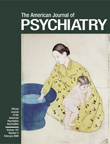Altered cAMP-Dependent Protein Kinase A in Platelets of Patients With Obsessive-Compulsive Disorder
Abstract
OBJECTIVE: The purpose of this study was to assess cAMP-dependent protein kinase A in patients with obsessive-compulsive disorder (OCD). METHOD: The levels and the activity of protein kinase A were evaluated in whole platelets obtained from 12 unmedicated patients with OCD and 15 healthy comparison subjects. RESULTS: The immunolabeling of protein kinase A regulatory subunits type I and II were significantly greater but that of the catalytic subunit significantly lower in patients with OCD than in healthy subjects. The cAMP-stimulated activity in patients with OCD was significantly lower than that in healthy subjects. CONCLUSIONS: These data suggest a possible role of protein kinase A in the pathophysiology of OCD.



